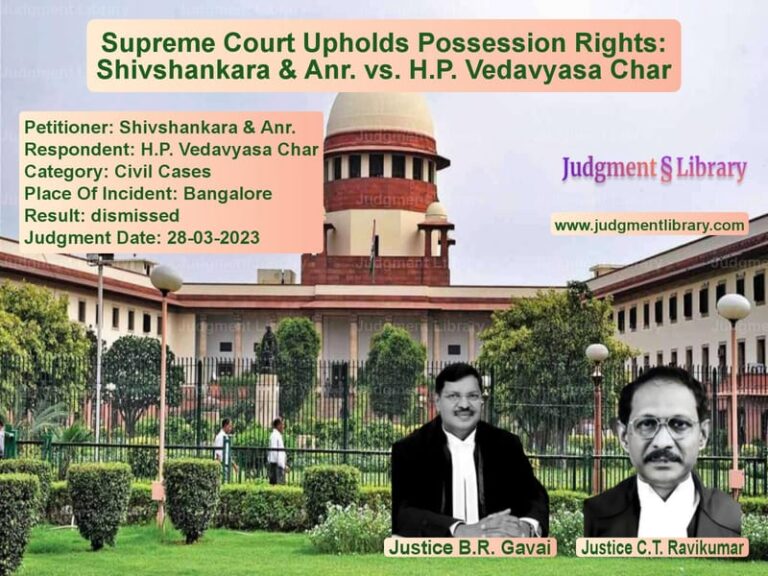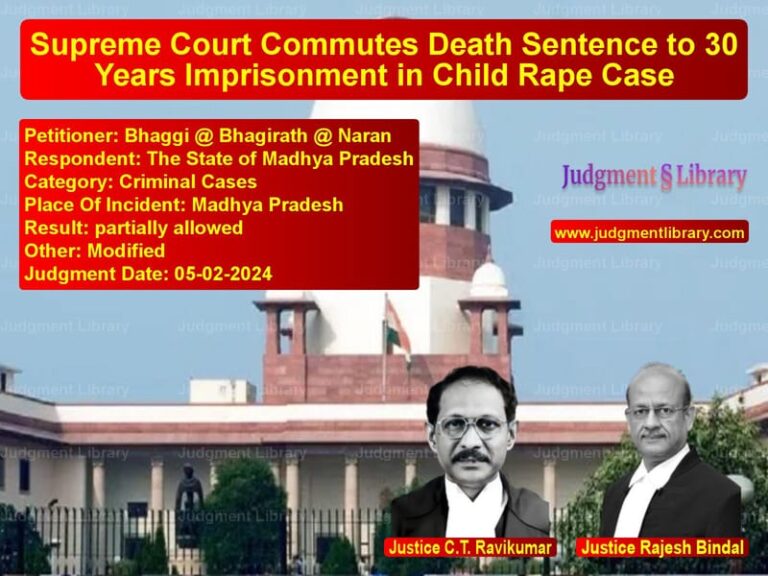Supreme Court Upholds Conviction in Cheque Bounce Case, Modifies Sentence
The Supreme Court of India, in the case of Triyambak S. Hegde vs. Sripad, ruled on a cheque bounce dispute under Section 138 of the Negotiable Instruments Act, 1881. The Court set aside the Karnataka High Court’s decision and reinstated the conviction ordered by the Judicial Magistrate, modifying the sentence to a fine with an option for imprisonment in case of default. This judgment underscores the importance of financial discipline in negotiable instruments and clarifies the scope of rebutting legal presumptions under the Act.
Background of the Case
The appellant, Triyambak S. Hegde, had entered into a property transaction with the respondent, Sripad. The respondent allegedly approached the appellant for financial assistance, offering to sell a house in Sirsi town for Rs. 4,00,000. The appellant paid an advance of Rs. 3,50,000 on June 6, 1996, and an agreement was executed.
Later, the appellant discovered that the property was registered in the respondent’s father’s name, making him ineligible to sell it. The appellant demanded a refund of the advance, and the respondent issued a cheque of Rs. 1,50,000 on May 17, 1998 as partial repayment. However, when the appellant presented the cheque on May 20, 1998, it was dishonored due to “insufficient funds.”
Legal Proceedings
1. Trial Court’s Decision
The appellant issued a legal notice to the respondent, which was ignored. Consequently, he filed a complaint under Section 138 of the Negotiable Instruments Act, 1881, before the Judicial Magistrate First Class (JMFC), Sirsi, on July 14, 1998. The Trial Court found the respondent guilty and convicted him on June 9, 2005, sentencing him to:
- Six months of simple imprisonment.
- A fine of Rs. 2,00,000, of which Rs. 1,95,000 was to be paid as compensation to the appellant.
2. Appeals Before the Sessions Court
The respondent appealed to the Sessions Court in Criminal Appeal No. 57/2005, while the appellant sought an enhancement of the sentence in Criminal Appeal No. 65/2005. The Sessions Judge dismissed both appeals, confirming the conviction and sentence.
3. Karnataka High Court’s Ruling
The respondent challenged the decision in Criminal Revision Petition No. 1282/2006, and the appellant filed Criminal Revision Petition No. 1481/2006. The Karnataka High Court allowed the respondent’s revision and set aside the conviction, reasoning that the appellant had not proved the loan transaction. The appellant then approached the Supreme Court.
Supreme Court’s Key Observations
1. Presumption Under Section 139 of NI Act
The Supreme Court ruled that once a cheque is signed and issued, a presumption arises under Section 139 that it was issued to discharge a legally enforceable debt or liability. The Court noted:
“It shall be presumed, unless the contrary is proved, that the holder of a cheque received it for the discharge, in whole or in part, of any debt or other liability.”
2. Rebuttal of Presumption
The Court clarified that the accused could rebut this presumption by proving, on the balance of probabilities, that the cheque was not issued for any enforceable debt. However, in this case, the respondent’s claim that he signed the cheque under undue influence was not supported by any documentary or oral evidence.
3. Failure to Respond to Legal Notice
The Court noted that the respondent had received the appellant’s demand notice after the cheque bounced but failed to reply or deny liability. This strengthened the appellant’s case.
4. High Court’s Overreach
The Supreme Court held that the High Court had improperly overturned concurrent findings of the lower courts by disregarding the presumption under the NI Act.
“The High Court was not justified in reappreciating evidence and concluding that the complainant had not proved the loan transaction when the respondent failed to rebut the presumption under law.”
Final Judgment
The Supreme Court:
- Set aside the Karnataka High Court’s order.
- Restored the respondent’s conviction under Section 138 of the NI Act.
- Modified the sentence to a fine of Rs. 2,50,000 payable within three months, failing which the respondent would face six months of simple imprisonment.
- Directed that Rs. 2,40,000 be paid to the appellant as compensation.
Implications of the Judgment
1. Strengthening Financial Discipline
The ruling reinforces the importance of honoring negotiable instruments and deters misuse of cheque transactions.
2. Balancing Judicial Review
The judgment clarifies that appellate courts should not overturn concurrent factual findings without sufficient cause.
3. Ensuring Fairness in Sentencing
By replacing imprisonment with a fine, the Court acknowledged the long lapse of time since the transaction while ensuring that the complainant was compensated.
Conclusion
The Supreme Court’s decision in Triyambak S. Hegde vs. Sripad reaffirms that dishonored cheques carry serious consequences and that courts must ensure strict compliance with the NI Act. The ruling underscores that once a cheque is issued, a strong presumption arises in favor of the holder, and the burden lies on the issuer to disprove liability.
Petitioner Name: Triyambak S. Hegde.Respondent Name: Sripad.Judgment By: Justice N.V. Ramana, Justice Surya Kant, Justice A.S. Bopanna.Place Of Incident: Sirsi, Karnataka.Judgment Date: 23-09-2021.
Don’t miss out on the full details! Download the complete judgment in PDF format below and gain valuable insights instantly!
Download Judgment: triyambak-s.-hegde-vs-sripad-supreme-court-of-india-judgment-dated-23-09-2021.pdf
Directly Download Judgment: Directly download this Judgment
See all petitions in Fraud and Forgery
See all petitions in Cheque Dishonour Cases
See all petitions in Bail and Anticipatory Bail
See all petitions in Debt Recovery
See all petitions in Judgment by N.V. Ramana
See all petitions in Judgment by Surya Kant
See all petitions in Judgment by A. S. Bopanna
See all petitions in allowed
See all petitions in Modified
See all petitions in supreme court of India judgments September 2021
See all petitions in 2021 judgments
See all posts in Criminal Cases Category
See all allowed petitions in Criminal Cases Category
See all Dismissed petitions in Criminal Cases Category
See all partially allowed petitions in Criminal Cases Category







